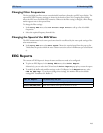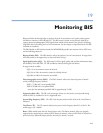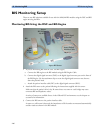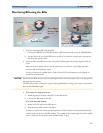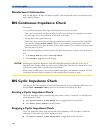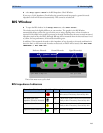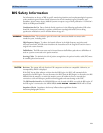
BIS Safety Information 19 Monitoring BIS
221
BIS Safety Information
For information on the use of BIS in specific monitoring situations and on pharmacological responses
to the anesthetic agents Nitrous Oxide (when used as the sole anesthetic agent), Ketamine, and
Etomidate, please contact Aspect Medical Systems to request a copy of their publication “A Clinician’s
Guide to the Bispectral Index®”.
Considerations for Use Due to limited clinical experience in the following applications, BIS values
should be interpreted cautiously in patients with known neurological disorders, those taking
psychoactive medications, and in children below the age of 1.
WARNING Conductive Parts The conductive parts of sensors and connectors should not contact other
conductive parts, including earth.
High-frequency Surgery To reduce the hazard of burns in the high-frequency surgical neutral
electrode connection, the BIS sensor should not be located between the surgical site and the electro-
surgical unit return electrode.
Defibrillation The BIS sensor must not be located between defibrillator pads when a defibrillator is
used on a patient connected to the patient monitor.
Securing Cables To minimize the risk of patient strangulation, the patient interface cable (PIC) must
be carefully placed and secured.
CAUTION Revisions The system will only function if all component revisions are compatible. Otherwise, an
incompatibility INOP is displayed.
If the DSC has an older software revision than the BIS Engine, the DSC will automatically be
upgraded by the BIS Engine. Do not disconnect the DSC from the BIS Engine, or disconnect the BIS
module from the monitor, or switch the monitor power off within the first ten seconds after
connection, as this will disrupt a possible software upgrade and cause damage to the DSC.
The BIS Interface board for the MP20/MP30 can only be used with BISx, not with the BIS engine. If
the BIS engine is connected to the MP20/MP30 a BIS ENGINE INCOMPT INOP will be issued.
Impedance Checks Impedance checks may influence data acquisition of other
electroencephalographic devices.



